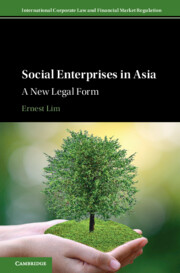Refine search
Actions for selected content:
11 results

Incorporating Purpose
- The New Legal Foundations for the Corporation and its Management
-
- Published online:
- 11 February 2025
- Print publication:
- 06 March 2025
-
- Element
- Export citation
1 - Introduction and Overview
-
- Book:
- Social Enterprises in Asia
- Published online:
- 12 March 2023
- Print publication:
- 30 March 2023, pp 1-45
-
- Chapter
- Export citation
3 - Directors’ Duties
-
- Book:
- Social Enterprises in Asia
- Published online:
- 12 March 2023
- Print publication:
- 30 March 2023, pp 79-100
-
- Chapter
- Export citation
2 - Corporate Purpose
-
- Book:
- Social Enterprises in Asia
- Published online:
- 12 March 2023
- Print publication:
- 30 March 2023, pp 46-78
-
- Chapter
- Export citation

Social Enterprises in Asia
- A New Legal Form
-
- Published online:
- 12 March 2023
- Print publication:
- 30 March 2023
6 - What about the Benefit Corporation?
- from Part I - The Law
-
- Book:
- The Profit Motive
- Published online:
- 02 February 2023
- Print publication:
- 09 February 2023, pp 79-82
-
- Chapter
- Export citation
17 - Shareholder Primacy in Benefit Corporations
- from Part IV - Stakeholders and Society
-
-
- Book:
- Fiduciary Obligations in Business
- Published online:
- 20 August 2021
- Print publication:
- 09 September 2021, pp 318-333
-
- Chapter
- Export citation
Part III - Corporate Law, Corporate Governance and Sustainability: Case Studies
-
- Book:
- The Cambridge Handbook of Corporate Law, Corporate Governance and Sustainability
- Published online:
- 25 November 2019
- Print publication:
- 12 December 2019, pp 129-518
-
- Chapter
- Export citation
10 - Progress Is Possible
- from Part III - Corporate Law, Corporate Governance and Sustainability: Case Studies
-
-
- Book:
- The Cambridge Handbook of Corporate Law, Corporate Governance and Sustainability
- Published online:
- 25 November 2019
- Print publication:
- 12 December 2019, pp 131-145
-
- Chapter
- Export citation
46 - Social Enterprise Law
- from Part IV - Potential Drivers for Change
-
-
- Book:
- The Cambridge Handbook of Corporate Law, Corporate Governance and Sustainability
- Published online:
- 25 November 2019
- Print publication:
- 12 December 2019, pp 655-668
-
- Chapter
- Export citation
Part IV - Potential Drivers for Change
-
- Book:
- The Cambridge Handbook of Corporate Law, Corporate Governance and Sustainability
- Published online:
- 25 November 2019
- Print publication:
- 12 December 2019, pp 519-710
-
- Chapter
- Export citation
